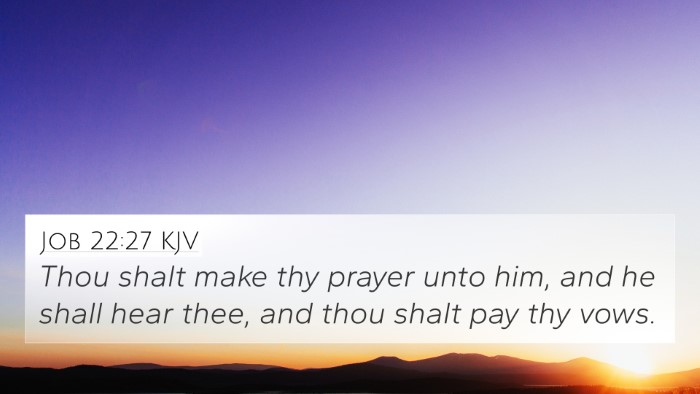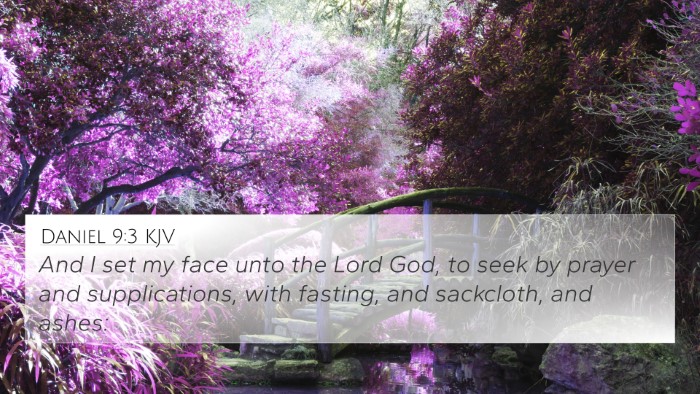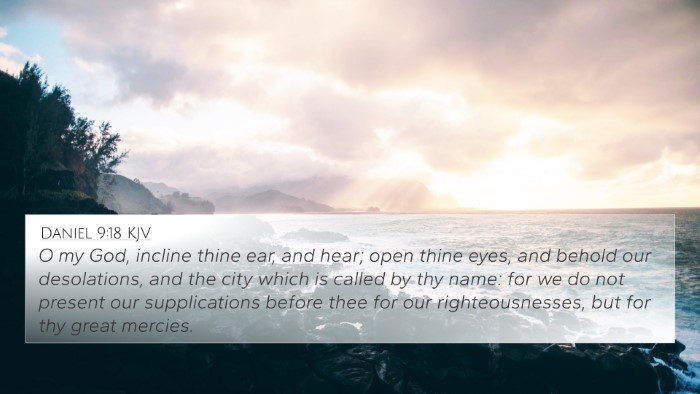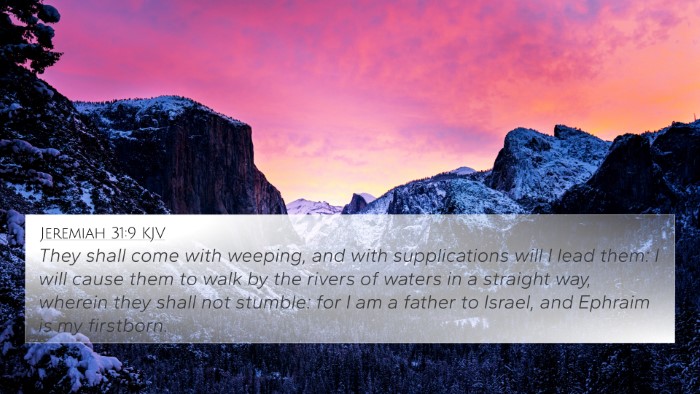Understanding Job 9:15: A Comprehensive Analysis
Job 9:15 reads: "Though I were innocent, I could not answer; I could only plead with my Judge for mercy." This poignant verse encapsulates Job's struggle in his attempts to justify himself before God during his time of suffering. The insights from various public domain commentaries provide a deeper understanding of the themes surrounding this scripture.
Commentary Insights
-
Matthew Henry:
Henry emphasizes God's supreme authority and justice. Job is aware of his inability to contend with the Almighty. This realization leads to a sincere plea for mercy rather than a defense of his righteousness. It highlights the theme of humility before God, acknowledging human limitations in understanding divine will.
-
Albert Barnes:
Barnes focuses on the despair Job feels in his situation, indicating that a mere mortal, regardless of innocence, cannot withstand the scrutiny of an omnipotent God. Job recognizes that even in innocence, he cannot claim righteousness in the face of divine judgment. His plea is for mercy—a recognition of God's grace over justice.
-
Adam Clarke:
Clarke delves into the emotional depth of Job’s words, illustrating the tension between human suffering and divine sovereignty. He suggests that Job's refusal to argue his innocence stems from an understanding of God’s omniscience. This depiction of Job's state invites readers to reflect on their pleas during times of trouble, fostering a deeper relationship with God based on trust and surrender.
Bible Cross-References
Job 9:15 is interlinked with several other verses that deepen our understanding of its meaning. Below are some key cross-references:
- Job 9:2: "Indeed, I know that this is true. But how can mere mortals prove their innocence before God?" - Acknowledges the limitations of human understanding before God.
- Romans 3:23: "For all have sinned and fall short of the glory of God." - Relates to the concept of human imperfection and the need for mercy.
- Proverbs 18:17: "In a lawsuit, the first to speak seems right, until someone comes forward and cross-examines." - Reflects the idea of justification being emergent and complex.
- Psalms 143:2: "Do not bring your servant into judgment, for no one living is righteous before you." - A cry for mercy that echoes Job's plea.
- Micah 6:8: "He has shown you, O mortal, what is good. And what does the Lord require of you? To act justly and to love mercy and to walk humbly with your God." - Highlights the attitude God desires from humanity.
- Matthew 11:28: "Come to me, all you who are weary and burdened, and I will give you rest." - Jesus invites those under distress to seek comfort, a connection to Job's situation.
- Hebrews 4:16: "Let us then approach God's throne of grace with confidence, so that we may receive mercy and find grace to help us in our time of need." - Encourages seeking mercy from God in times of trouble.
Thematic Connections and Reflections
The theme of suffering and divine justice pervades Job's discourse and resonates through scripture. In Job 9:15, the core recognition of human limitations against divine authority asks believers to reflect on various important aspects of faith:
-
Suffering and God's Sovereignty:
Job's profound statement provides a foundation for understanding suffering within the context of divine purpose, reminding readers of the mystery of God's workings in the world.
-
Faith in Times of Distress:
The assertion of seeking mercy rather than defense encourages believers to hold onto faith even when circumstances are overwhelming. It encourages the faithful to find solace in the mercy of God.
-
The Nature of True Justice:
This verse invites discussions around the nature of divine justice versus human perceptions. It points to the need for a deeper understanding of righteousness in the face of God’s omnipotence.
Tools for Bible Cross-Referencing
To explore connections between Bible verses and deepen understanding, various tools can be employed, such as:
- Bible Concordance: A useful resource for identifying word occurrences and their locations throughout scripture.
- Bible Cross-Reference Guide: Consolidates connections between verses, helping believers draw thematic links.
- Cross-Reference Bible Study: Methods that allow for comparative analysis of similar themes across books of the Bible.
Finding Cross-References
For those seeking to identify connections across scripture, consider the following ways:
- Study the context: Understanding the surrounding verses can provide clarity on themes and allegories.
- Use thematic studies: Explore topics like justice, mercy, and suffering, identifying verses that speak to these themes within both the Old and New Testaments.
- Create a reference list: Keeping a record of personal insights and observations can aid in understanding the Bible's interwoven nature.
Conclusion
Job 9:15 serves as a powerful reminder of our human frailty and the necessity of seeking mercy from God in the face of life's greatest challenges. The insights gathered from renowned commentaries enhance our understanding and encourage deep reflection on the relational dynamics between humanity and the divine. Through cross-referencing, believers can grasp the richness of God’s interactions throughout scripture, fostering a better grasp of Biblical themes and truths. Engaging with these scriptures through prayer, study, and contemplation opens a channel for greater understanding of divine mercy and justice, forming a solid foundation for faith despite trials.
















